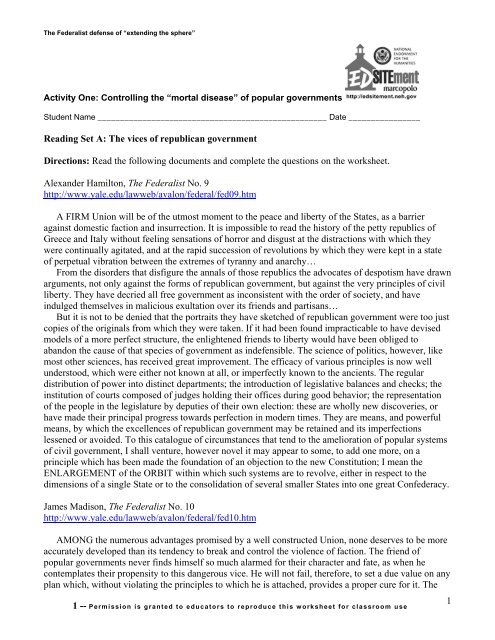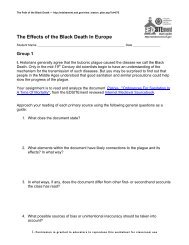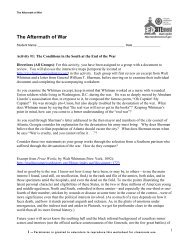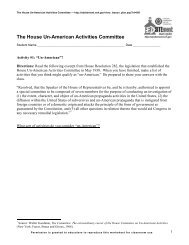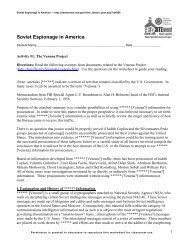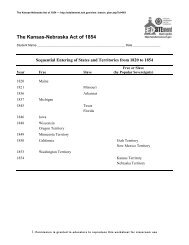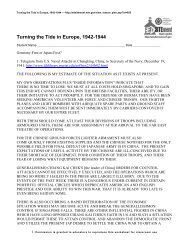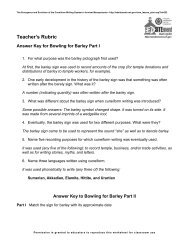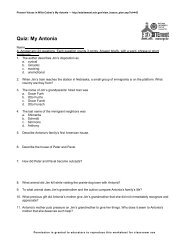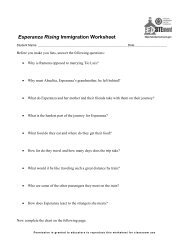Worksheet for Activity 1 - EDSITEment
Worksheet for Activity 1 - EDSITEment
Worksheet for Activity 1 - EDSITEment
Create successful ePaper yourself
Turn your PDF publications into a flip-book with our unique Google optimized e-Paper software.
The Federalist defense of “extending the sphere”<br />
<strong>Activity</strong> One: Controlling the “mortal disease” of popular governments<br />
Student Name ___________________________________________________ Date ________________<br />
Reading Set A: The vices of republican government<br />
Directions: Read the following documents and complete the questions on the worksheet.<br />
Alexander Hamilton, The Federalist No. 9<br />
http://www.yale.edu/lawweb/avalon/federal/fed09.htm<br />
A FIRM Union will be of the utmost moment to the peace and liberty of the States, as a barrier<br />
against domestic faction and insurrection. It is impossible to read the history of the petty republics of<br />
Greece and Italy without feeling sensations of horror and disgust at the distractions with which they<br />
were continually agitated, and at the rapid succession of revolutions by which they were kept in a state<br />
of perpetual vibration between the extremes of tyranny and anarchy…<br />
From the disorders that disfigure the annals of those republics the advocates of despotism have drawn<br />
arguments, not only against the <strong>for</strong>ms of republican government, but against the very principles of civil<br />
liberty. They have decried all free government as inconsistent with the order of society, and have<br />
indulged themselves in malicious exultation over its friends and partisans…<br />
But it is not to be denied that the portraits they have sketched of republican government were too just<br />
copies of the originals from which they were taken. If it had been found impracticable to have devised<br />
models of a more perfect structure, the enlightened friends to liberty would have been obliged to<br />
abandon the cause of that species of government as indefensible. The science of politics, however, like<br />
most other sciences, has received great improvement. The efficacy of various principles is now well<br />
understood, which were either not known at all, or imperfectly known to the ancients. The regular<br />
distribution of power into distinct departments; the introduction of legislative balances and checks; the<br />
institution of courts composed of judges holding their offices during good behavior; the representation<br />
of the people in the legislature by deputies of their own election: these are wholly new discoveries, or<br />
have made their principal progress towards perfection in modern times. They are means, and powerful<br />
means, by which the excellences of republican government may be retained and its imperfections<br />
lessened or avoided. To this catalogue of circumstances that tend to the amelioration of popular systems<br />
of civil government, I shall venture, however novel it may appear to some, to add one more, on a<br />
principle which has been made the foundation of an objection to the new Constitution; I mean the<br />
ENLARGEMENT of the ORBIT within which such systems are to revolve, either in respect to the<br />
dimensions of a single State or to the consolidation of several smaller States into one great Confederacy.<br />
James Madison, The Federalist No. 10<br />
http://www.yale.edu/lawweb/avalon/federal/fed10.htm<br />
AMONG the numerous advantages promised by a well constructed Union, none deserves to be more<br />
accurately developed than its tendency to break and control the violence of faction. The friend of<br />
popular governments never finds himself so much alarmed <strong>for</strong> their character and fate, as when he<br />
contemplates their propensity to this dangerous vice. He will not fail, there<strong>for</strong>e, to set a due value on any<br />
plan which, without violating the principles to which he is attached, provides a proper cure <strong>for</strong> it. The<br />
1 -- Permission is granted to educators to reproduce this worksheet <strong>for</strong> classroom use<br />
1
The Federalist defense of “extending the sphere”<br />
instability, injustice, and confusion introduced into the public councils, have, in truth, been the mortal<br />
diseases under which popular governments have everywhere perished; as they continue to be the favorite<br />
and fruitful topics from which the adversaries to liberty derive their most specious declamations…<br />
Complaints are everywhere heard from our most considerate and virtuous citizens, equally the friends of<br />
public and private faith, and of public and personal liberty, that our governments are too unstable, that<br />
the public good is disregarded in the conflicts of rival parties, and that measures are too often decided,<br />
not according to the rules of justice and the rights of the minor party, but by the superior <strong>for</strong>ce of an<br />
interested and overbearing majority. However anxiously we may wish that these complaints had no<br />
foundation, the evidence, of known facts will not permit us to deny that they are in some degree<br />
true…These must be chiefly, if not wholly, effects of the unsteadiness and injustice with which a<br />
factious spirit has tainted our public administrations.<br />
By a faction, I understand a number of citizens, whether amounting to a majority or a minority of the<br />
whole, who are united and actuated by some common impulse of passion, or of interest, adverse to the<br />
rights of other citizens, or to the permanent and aggregate interests of the community.<br />
There are two methods of curing the mischiefs of faction: the one, by removing its causes; the other,<br />
by controlling its effects.<br />
There are again two methods of removing the causes of faction: the one, by destroying the liberty<br />
which is essential to its existence; the other, by giving to every citizen the same opinions, the same<br />
passions, and the same interests.<br />
It could never be more truly said than of the first remedy, that it was worse than the disease. Liberty<br />
is to faction what air is to fire, an aliment without which it instantly expires. But it could not be less folly<br />
to abolish liberty, which is essential to political life, because it nourishes faction, than it would be to<br />
wish the annihilation of air, which is essential to animal life, because it imparts to fire its destructive<br />
agency.<br />
The second expedient is as impracticable as the first would be unwise. As long as the reason of man<br />
continues fallible, and he is at liberty to exercise it, different opinions will be <strong>for</strong>med. As long as the<br />
connection subsists between his reason and his self-love, his opinions and his passions will have a<br />
reciprocal influence on each other; and the <strong>for</strong>mer will be objects to which the latter will attach<br />
themselves. The diversity in the faculties of men, from which the rights of property originate, is not less<br />
an insuperable obstacle to a uni<strong>for</strong>mity of interests. The protection of these faculties is the first object of<br />
government. From the protection of different and unequal faculties of acquiring property, the possession<br />
of different degrees and kinds of property immediately results; and from the influence of these on the<br />
sentiments and views of the respective proprietors, ensues a division of the society into different<br />
interests and parties.<br />
The latent causes of faction are thus sown in the nature of man; and we see them everywhere brought<br />
into different degrees of activity, according to the different circumstances of civil society. A zeal <strong>for</strong><br />
different opinions concerning religion, concerning government, and many other points, as well of<br />
speculation as of practice; an attachment to different leaders ambitiously contending <strong>for</strong> pre-eminence<br />
and power; or to persons of other descriptions whose <strong>for</strong>tunes have been interesting to the human<br />
passions, have, in turn, divided mankind into parties, inflamed them with mutual animosity, and<br />
rendered them much more disposed to vex and oppress each other than to co-operate <strong>for</strong> their common<br />
good. So strong is this propensity of mankind to fall into mutual animosities, that where no substantial<br />
occasion presents itself, the most frivolous and fanciful distinctions have been sufficient to kindle their<br />
unfriendly passions and excite their most violent conflicts. But the most common and durable source of<br />
factions has been the various and unequal distribution of property. Those who hold and those who are<br />
without property have ever <strong>for</strong>med distinct interests in society. Those who are creditors, and those who<br />
are debtors, fall under a like discrimination. A landed interest, a manufacturing interest, a mercantile<br />
interest, a moneyed interest, with many lesser interests, grow up of necessity in civilized nations, and<br />
divide them into different classes, actuated by different sentiments and views. The regulation of these<br />
2 -- Permission is granted to educators to reproduce this worksheet <strong>for</strong> classroom use<br />
2
The Federalist defense of “extending the sphere”<br />
various and interfering interests <strong>for</strong>ms the principal task of modern legislation, and involves the spirit of<br />
party and faction in the necessary and ordinary operations of the government…<br />
It is in vain to say that enlightened statesmen will be able to adjust these clashing interests, and<br />
render them all subservient to the public good. Enlightened statesmen will not always be at the helm…<br />
The inference to which we are brought is, that the CAUSES of faction cannot be removed, and that<br />
relief is only to be sought in the means of controlling its EFFECTS.<br />
If a faction consists of less than a majority, relief is supplied by the republican principle, which<br />
enables the majority to defeat its sinister views by regular vote. It may clog the administration, it may<br />
convulse the society; but it will be unable to execute and mask its violence under the <strong>for</strong>ms of the<br />
Constitution. When a majority is included in a faction, the <strong>for</strong>m of popular government, on the other<br />
hand, enables it to sacrifice to its ruling passion or interest both the public good and the rights of other<br />
citizens. To secure the public good and private rights against the danger of such a faction, and at the<br />
same time to preserve the spirit and the <strong>for</strong>m of popular government, is then the great object to which<br />
our inquiries are directed. Let me add that it is the great desideratum by which this <strong>for</strong>m of government<br />
can be rescued from the opprobrium under which it has so long labored, and be recommended to the<br />
esteem and adoption of mankind.<br />
By what means is this object attainable? Evidently by one of two only. Either the existence of the<br />
same passion or interest in a majority at the same time must be prevented, or the majority, having such<br />
coexistent passion or interest, must be rendered, by their number and local situation, unable to concert<br />
and carry into effect schemes of oppression. If the impulse and the opportunity be suffered to coincide,<br />
we well know that neither moral nor religious motives can be relied on as an adequate control…<br />
3 -- Permission is granted to educators to reproduce this worksheet <strong>for</strong> classroom use<br />
3
The Federalist defense of “extending the sphere”<br />
<strong>Activity</strong> One: Controlling the “mortal disease” of popular governments<br />
Student Name ___________________________________________________ Date ________________<br />
Directions: Read the documents assigned <strong>for</strong> <strong>Activity</strong> One (Reading Set A) and answer the questions<br />
on the worksheet.<br />
Question<br />
Answer<br />
1. According to Alexander<br />
Hamilton in The Federalist No. 9,<br />
why have some Americans<br />
criticized a republican <strong>for</strong>m of<br />
government?<br />
2. What are the five improvements<br />
to “the science of politics,”<br />
according to Hamilton, that will<br />
make the American republic work?<br />
3. What evidence does James<br />
Madison give in The Federalist No.<br />
10 that American government has<br />
been “tainted” by a “factious<br />
spirit”?<br />
4. How does Madison define a<br />
“faction” in The Federalist No. 10?<br />
4 -- Permission is granted to educators to reproduce this worksheet <strong>for</strong> classroom use<br />
4
The Federalist defense of “extending the sphere”<br />
5. What are the two possible<br />
methods of removing the causes of<br />
faction, according to Madison?<br />
6. Why does Madison reject both<br />
of these methods of removing the<br />
causes of faction?<br />
7. Why does Madison conclude<br />
that the causes of faction cannot<br />
be removed?<br />
8. How does a republican <strong>for</strong>m of<br />
government control the effects of<br />
minority faction, according to<br />
Madison?<br />
9. What are the two methods,<br />
according to Madison, of<br />
controlling the effects of majority<br />
faction?<br />
5 -- Permission is granted to educators to reproduce this worksheet <strong>for</strong> classroom use<br />
5
The Federalist defense of “extending the sphere”<br />
<strong>Activity</strong> One: Controlling the “mortal disease” of popular governments<br />
Student Name ___________________________________________________ Date ________________<br />
Reading Set B: The benefits of “a large over a small republic”<br />
Directions: Read the following document and complete the questions on the worksheet.<br />
James Madison, The Federalist No. 10<br />
http://www.yale.edu/lawweb/avalon/federal/fed10.htm<br />
[A] pure democracy, by which I mean a society consisting of a small number of citizens, who<br />
assemble and administer the government in person, can admit of no cure <strong>for</strong> the mischiefs of faction. A<br />
common passion or interest will, in almost every case, be felt by a majority of the whole; a<br />
communication and concert result from the <strong>for</strong>m of government itself…Hence it is that such<br />
democracies have ever been spectacles of turbulence and contention; have ever been found incompatible<br />
with personal security or the rights of property; and have in general been as short in their lives as they<br />
have been violent in their deaths…<br />
A republic, by which I mean a government in which the scheme of representation takes place, opens<br />
a different prospect, and promises the cure <strong>for</strong> which we are seeking. Let us examine the points in which<br />
it varies from pure democracy, and we shall comprehend both the nature of the cure and the efficacy<br />
which it must derive from the Union. The two great points of difference between a democracy and a<br />
republic are: first, the delegation of the government, in the latter, to a small number of citizens elected<br />
by the rest; secondly, the greater number of citizens, and greater sphere of country, over which the latter<br />
may be extended…<br />
The [second] point of difference is, the greater number of citizens and extent of territory which may<br />
be brought within the compass of republican than of democratic government; and it is this circumstance<br />
principally which renders factious combinations less to be dreaded in the <strong>for</strong>mer than in the latter. The<br />
smaller the society, the fewer probably will be the distinct parties and interests composing it; the fewer<br />
the distinct parties and interests, the more frequently will a majority be found of the same party; and the<br />
smaller the number of individuals composing a majority, and the smaller the compass within which they<br />
are placed, the more easily will they concert and execute their plans of oppression. Extend the sphere,<br />
and you take in a greater variety of parties and interests; you make it less probable that a majority of the<br />
whole will have a common motive to invade the rights of other citizens; or if such a common motive<br />
exists, it will be more difficult <strong>for</strong> all who feel it to discover their own strength, and to act in unison with<br />
each other...<br />
Hence, it clearly appears, that the same advantage which a republic has over a democracy, in<br />
controlling the effects of faction, is enjoyed by a large over a small republic…The influence of factious<br />
leaders may kindle a flame within their particular States, but will be unable to spread a general<br />
conflagration through the other States…[A] wicked project, will be less apt to pervade the whole body<br />
of the Union than a particular member of it; in the same proportion as such a malady is more likely to<br />
taint a particular county or district, than an entire State. In the extent and proper structure of the Union,<br />
there<strong>for</strong>e, we behold a republican remedy <strong>for</strong> the diseases most incident to republican government.<br />
6 -- Permission is granted to educators to reproduce this worksheet <strong>for</strong> classroom use<br />
6
The Federalist defense of “extending the sphere”<br />
<strong>Activity</strong> One: Controlling the “mortal disease” of popular governments<br />
Student Name ___________________________________________________ Date ________________<br />
Directions: Read the document assigned <strong>for</strong> <strong>Activity</strong> One (Reading Set B) and answer the questions on<br />
the worksheet.<br />
Question<br />
Answer<br />
1. How does Madison define a “pure<br />
democracy”?<br />
2. How does Madison define a republic?<br />
3. According to Madison, what are the<br />
two great points of difference between a<br />
“pure democracy” and a republic?<br />
7 -- Permission is granted to educators to reproduce this worksheet <strong>for</strong> classroom use<br />
7
The Federalist defense of “extending the sphere”<br />
4. Why are “pure democracies” prone to<br />
the problem of faction?<br />
5. What are the two benefits of<br />
“extending the sphere,” according to<br />
Madison?<br />
6. What effect does “extending the<br />
sphere” have on the number of interests<br />
to be found in the nation?<br />
7. What are the benefits of having a<br />
large rather than a small republic,<br />
according to Madison?<br />
8 -- Permission is granted to educators to reproduce this worksheet <strong>for</strong> classroom use<br />
8
The Federalist defense of “extending the sphere”<br />
<strong>Activity</strong> One: Controlling the “mortal disease” of popular governments<br />
Student Name ___________________________________________________ Date ________________<br />
Reading Set C: “Extending the sphere” and multiplying interests<br />
Directions: Read the following document and complete the questions on the worksheet.<br />
James Madison, The Federalist No. 51<br />
http://www.yale.edu/lawweb/avalon/federal/fed51.htm<br />
It is of great importance in a republic not only to guard the society against the oppression of its<br />
rulers, but to guard one part of the society against the injustice of the other part. Different interests<br />
necessarily exist in different classes of citizens. If a majority be united by a common interest, the rights<br />
of the minority will be insecure.<br />
There are but two methods of providing against this evil: the one by creating a will in the community<br />
independent of the majority that is, of the society itself; the other, by comprehending in the society so<br />
many separate descriptions of citizens as will render an unjust combination of a majority of the whole<br />
very improbable, if not impracticable…The second method will be exemplified in the federal republic of<br />
the United States. Whilst all authority in it will be derived from and dependent on the society, the<br />
society itself will be broken into so many parts, interests, and classes of citizens, that the rights of<br />
individuals, or of the minority, will be in little danger from interested combinations of the majority.<br />
In a free government the security <strong>for</strong> civil rights must be the same as that <strong>for</strong> religious rights. It<br />
consists in the one case in the multiplicity of interests, and in the other in the multiplicity of sects. The<br />
degree of security in both cases will depend on the number of interests and sects; and this may be<br />
presumed to depend on the extent of country and number of people comprehended under the same<br />
government. This view of the subject must particularly recommend a proper federal system to all the<br />
sincere and considerate friends of republican government…Justice is the end of government. It is the<br />
end of civil society. It ever has been and ever will be pursued until it be obtained, or until liberty be lost<br />
in the pursuit. In a society under the <strong>for</strong>ms of which the stronger faction can readily unite and oppress<br />
the weaker, anarchy may as truly be said to reign as in a state of nature, where the weaker individual is<br />
not secured against the violence of the stronger…<br />
In the extended republic of the United States, and among the great variety of interests, parties, and<br />
sects which it embraces, a coalition of a majority of the whole society could seldom take place on any<br />
other principles than those of justice and the general good…It is no less certain than it is important,<br />
notwithstanding the contrary opinions which have been entertained, that the larger the society, provided<br />
it lie within a practical sphere, the more duly capable it will be of self-government. And happily <strong>for</strong> the<br />
REPUBLICAN CAUSE, the practicable sphere may be carried to a very great extent, by a judicious<br />
modification and mixture of the FEDERAL PRINCIPLE.<br />
9 -- Permission is granted to educators to reproduce this worksheet <strong>for</strong> classroom use<br />
9
The Federalist defense of “extending the sphere”<br />
<strong>Activity</strong> One: Controlling the “mortal disease” of popular governments<br />
Student Name ___________________________________________________ Date ________________<br />
Directions: Read the document assigned <strong>for</strong> <strong>Activity</strong> One (Reading Set C) and answer the questions on<br />
the worksheet.<br />
Question<br />
Answer<br />
1. What are the two dangers that society<br />
(and the liberties and rights of citizens)<br />
must be guarded against, according to<br />
Madison?<br />
2. What is it that makes “the rights of the<br />
minority” most insecure, according to<br />
Madison?<br />
3. What are the two methods of preventing<br />
the evil of faction, according to Madison?<br />
10 -- Permission is granted to educators to reproduce this worksheet <strong>for</strong> classroom use<br />
10
The Federalist defense of “extending the sphere”<br />
4. Which method of preventing the evil of<br />
faction does Madison prefer, and why?<br />
5. Why does the extended republic make<br />
“a coalition of a majority of the whole<br />
society” less likely, according to Madison?<br />
6. Why does “justice” require a solution to<br />
the problem of majority faction?<br />
11 -- Permission is granted to educators to reproduce this worksheet <strong>for</strong> classroom use<br />
11


